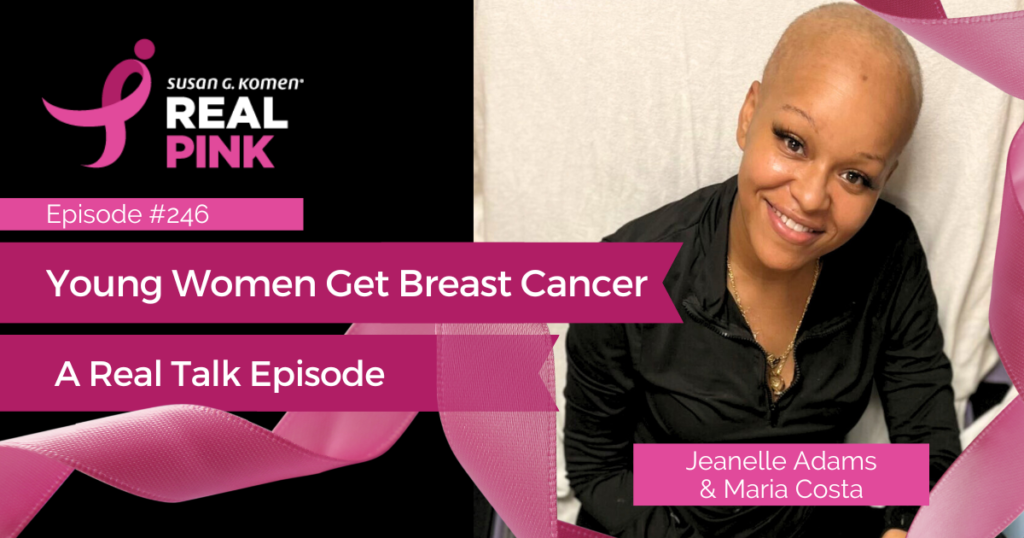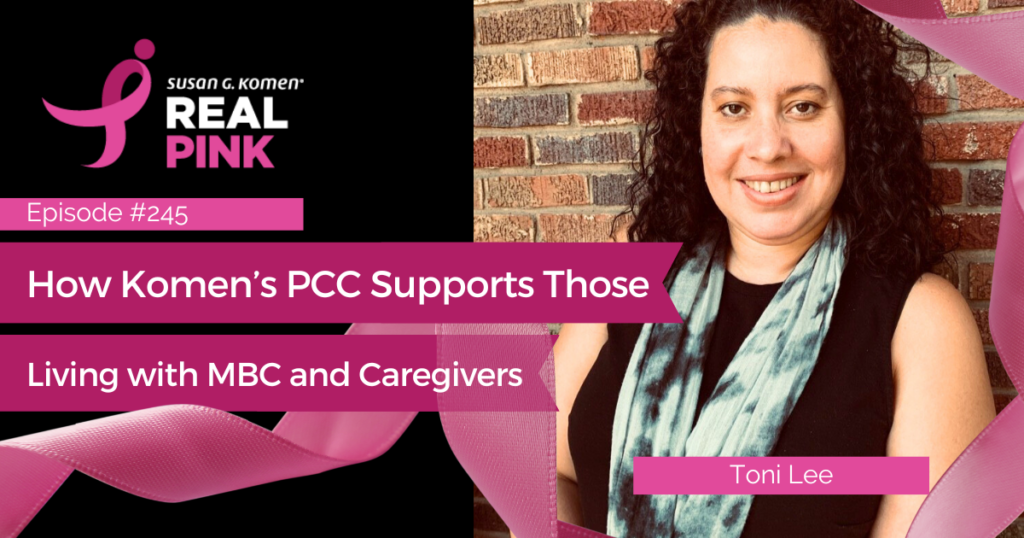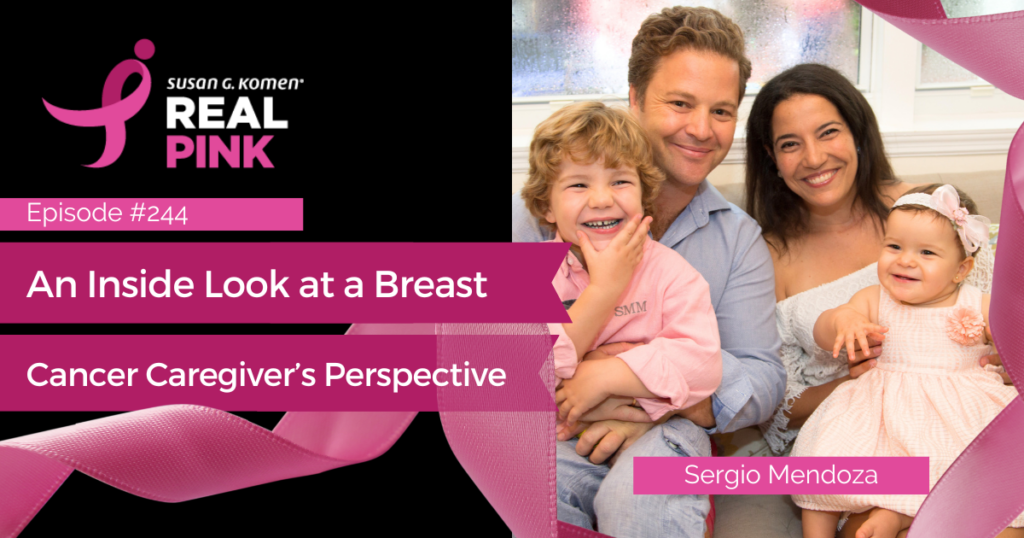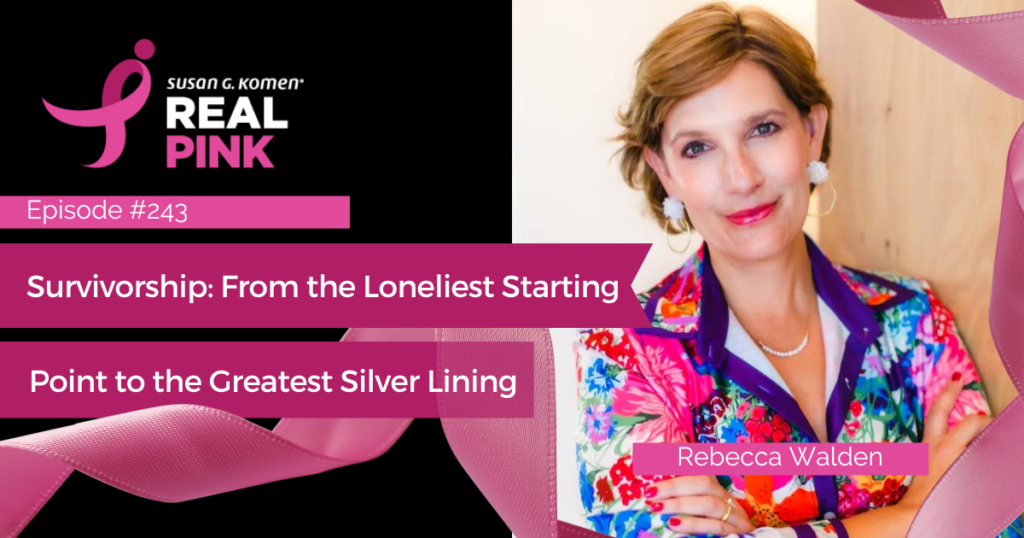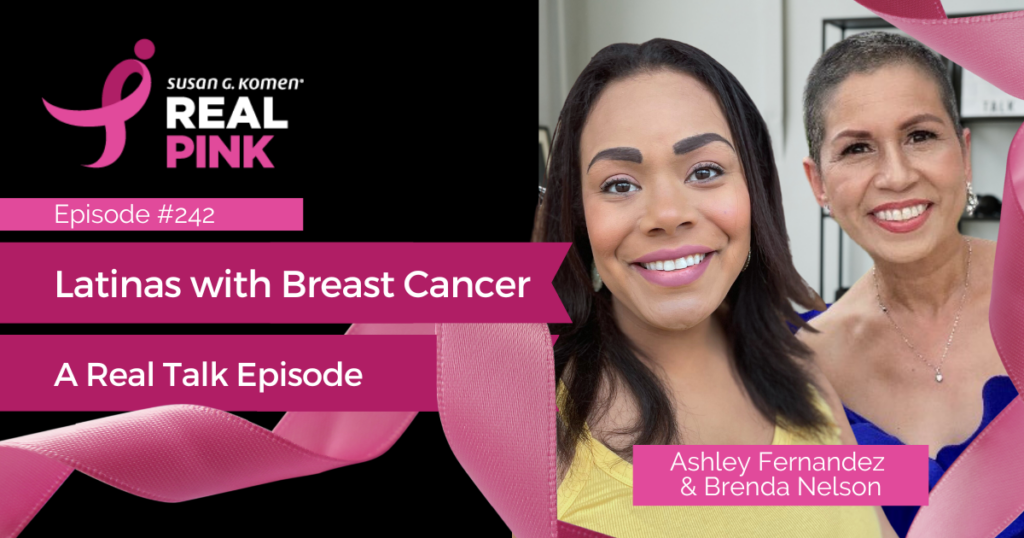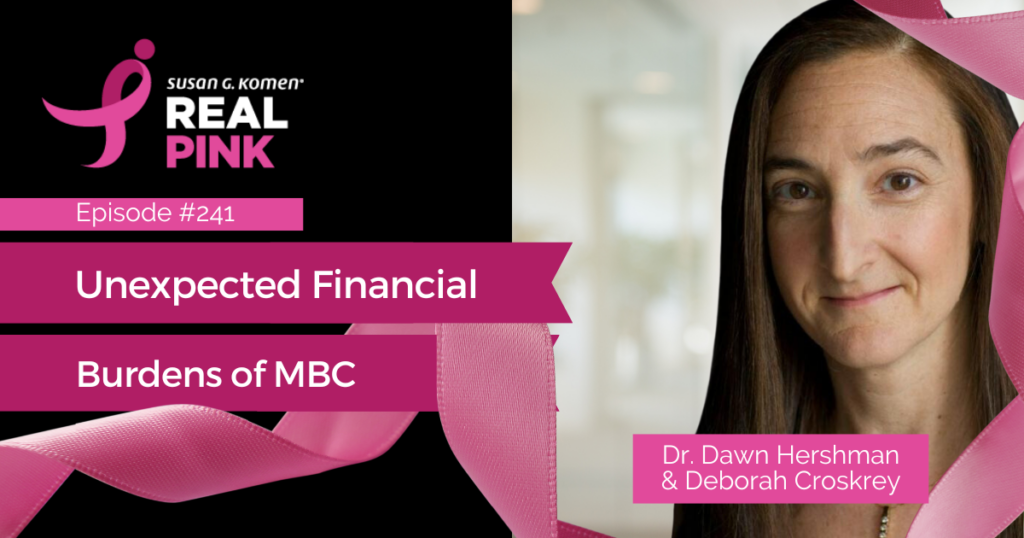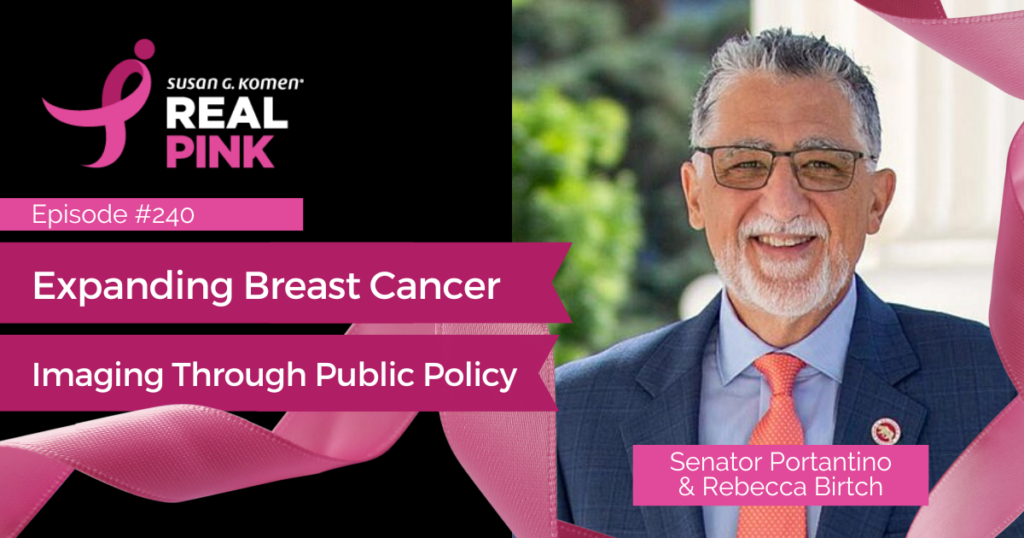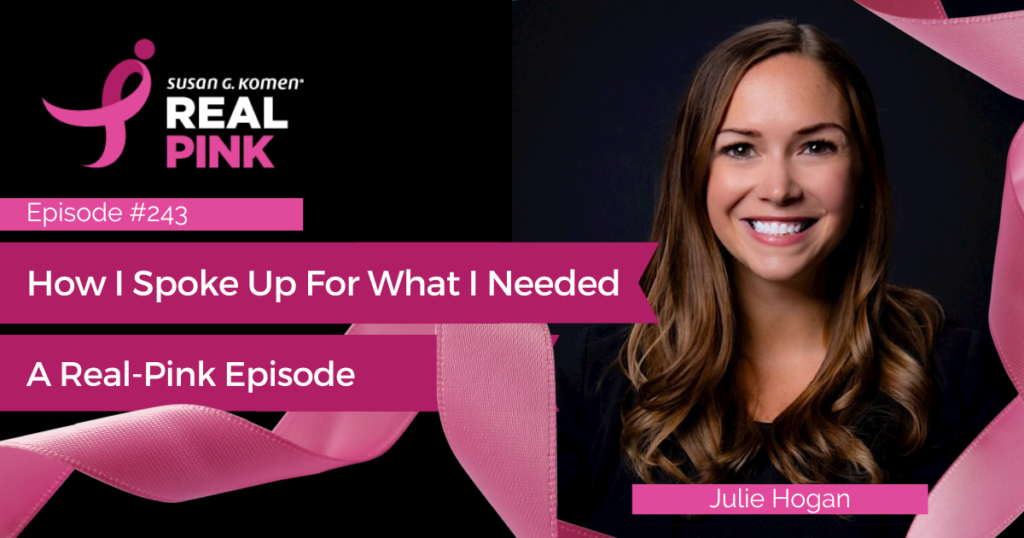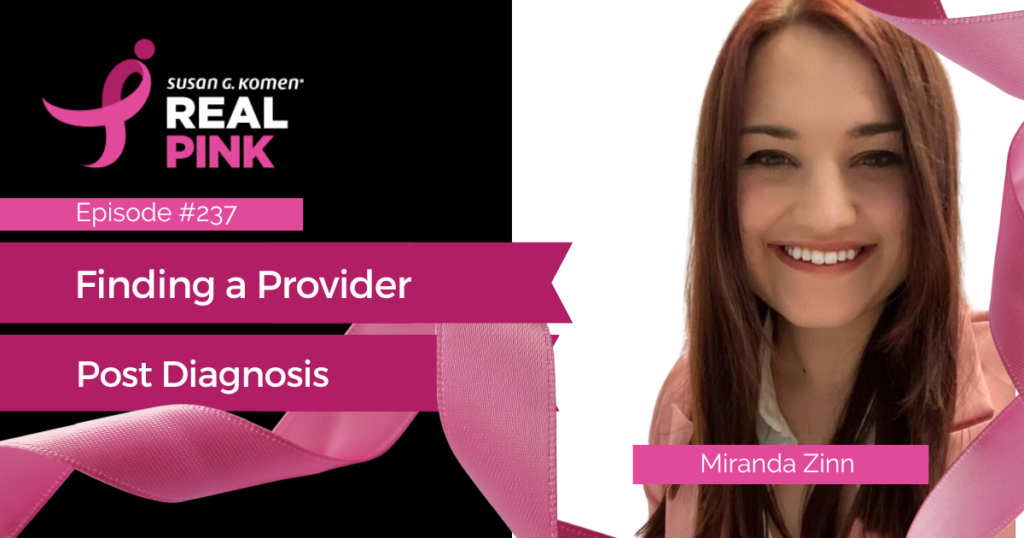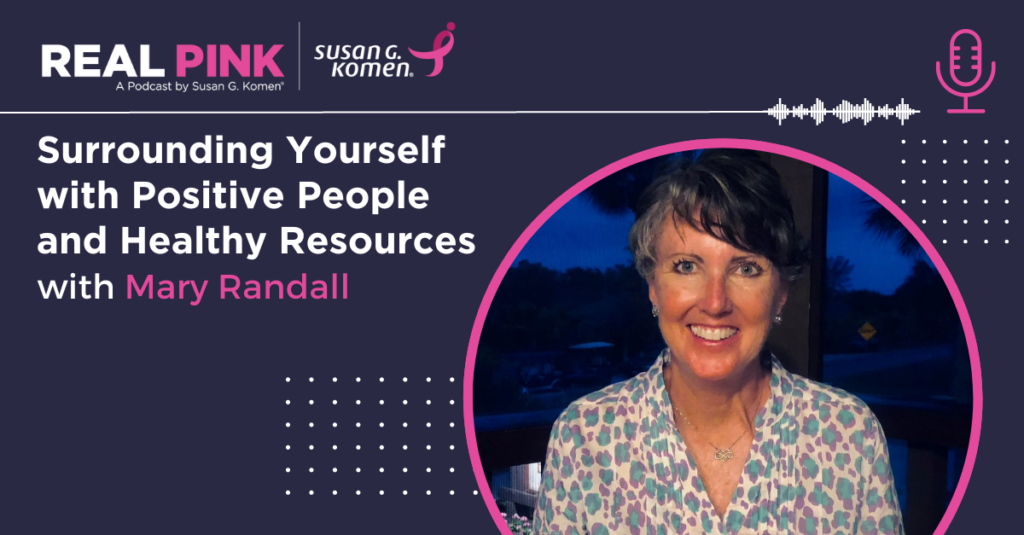Real Pink Podcast Episodes
Real Talk: Young Women Get Breast Cancer
Real Talk was created to talk about real issues and although the average age at the time of a breast cancer diagnosis is 62, young women are being diagnosed every day. We’ll use this conversation to share the experiences of what it is like to go through breast cancer at a younger age, before many women even get married, have children or have an established career.
We’ll also use Maria and Jeanelle’s lived experiences to provide help (hope) and inspiration to others in this situation. Both women have been fierce advocates for themselves and the care they needed. Women who are struggling to be heard and believed can draw on their experiences to keep speaking up. This is also a great conversation to educate doctors and health care providers that no one is too young for breast cancer and should be taken seriously.
Read MoreHow Komen’s PCC Supports Those Living with MBC and Caregivers
[00:00:00] Adam Walker: From Susan G Komen, this is Real Pink. A podcast exploring real stories, struggles, and triumphs related to breast cancer. We’re taking the conversation from the doctor’s office to your living room. Metastatic breast cancer, also called stage four, is when breast cancer is spread beyond the breast to other parts of…
Read MoreAn Inside Look at a Breast Cancer Caregiver’s Perspective
Sergio Andres Mendoza lost the love of his life, Sarah Fernandez Mendoza, to metastatic breast cancer in 2017. Since then, he has worked tirelessly to honor Sarah’s legacy while raising their two young children, giving back to Komen in multiple ways and providing inspiration for other breast cancer caregivers who are going through what he experienced. Sergio is here today to talk about caregiver support and how he supports Komen’s mission to end breast cancer.
Read MoreSurvivorship: From the Loneliest Starting Point to the Greatest Silver Lining
When active treatment ends and the last appointment is over, you are feeling many emotions. Normal is nowhere on the list. This is a point upon which most everyone can agree – there has been a great deal written about the harsh reality patients face when treatment ends, and even that word – patient. You really are no longer a patient, and that in and of itself requires a mindset shift. For all these weeks and months of treatment, a patient is all you have been. And now you’re back to your Before Life. But nothing feels like Before. Today’s guest felt ill prepared for the abrupt end of treatment and the challenge of jumping back into the rhythm of what her life looked like before breast cancer. She thought about what she wanted her survivorship to look like and found a way to take something painful and turn into something purposeful. Rebecca Walden is here to share her story with us and how she now writes about her experience to help, inspire and heal others.
Read MoreReal Talk: Latinas with Breast Cancer
This is Real Talk, a new podcast series where we’re going to break down the stigmas and feelings of embarrassment and talk openly and honestly about just how difficult breast cancer can be – from diagnosis, to treatment, to living with metastatic breast cancer, to life after treatment ends.
September is Hispanic Heritage Month. Breast cancer is the most common form of cancer among Latinas and today I’m pleased to welcome two women who can help break down the cultural and personal stigmas about breast cancer in the Latina community.
Ashley Fernandez and Brenda Nelson are also living with metastatic breast cancer, the most advanced stage of breast cancer that cannot be cured. They’ve both felt that making friends in a new community has been hard, as they didn’t want to overshare about their lives but also wanted to be genuine and form new friendships.
Read MoreUnexpected Financial Burdens of Metastatic Breast Cancer
Continuously increasing treatment costs for patients with metastatic breast cancer can create financial hardship, which is known as financial toxicity. According to The Kaiser Family Foundation, more than 50% of women delay or avoid breast cancer care because of the associated costs. Financial toxicity can lead to difficulty accessing nutritious food and paying bills, as well as keeping up with the cost of basic living expenses. There can be many other hidden costs that add up quickly, including the cost of childcare during medical appointments and gasoline for trips to the doctor. All these stressors negatively impact cancer care by affecting a patient’s health, medication adherence, quality of life and mental health. Here today to talk to us about these unexpected costs associated with an MBC Diagnosis are Komen Scholar and Professor of Medicine and Epidemiology and Director of the Breast Cancer Program of the Herbert Irving Comprehensive Cancer Center, Dr. Dawn Hershman, and an incredible woman who has been living with MBC for 18 years, Deborah Croskrey.
Read MoreExpanding Breast Cancer Imaging Through Public Policy
Widespread access to preventive screening mammography, without cost sharing, is available to millions of women as a result of the Affordable Care Act (ACA). Unfortunately, some individuals at a higher risk of breast cancer or those requiring follow-up imaging due to an abnormal mammogram result face hundreds to thousands of dollars in patient cost sharing. Susan G. Komen is committed to championing legislation that addresses this disparity in health insurance coverage to ensure all cancer patients have fair and equitable access to breast imaging that may save their lives. Here today to discuss Komen’s public policy efforts at the state level are California State Senator Anthony Portantino and Rebecca Birch, Komen’s Director of State Policy & Advocacy.
Read MoreHow I Spoke Up For What I Needed
[00:00:00] Adam Walker: From Susan G. Komen, this is Real Pink, a podcast exploring real stories, struggles, and triumphs related to breast cancer. We’re taking the conversation from the doctor’s office to your living room When someone has breast cancer, it’s scary for them and for you, what can you do to really help? What…
Read MoreFinding a Provider Post-Diagnosis
A breast cancer diagnosis can be overwhelming. Knowing which questions to ask can help you understand your diagnosis and advocate for yourself as you begin to assemble your healthcare team and develop your treatment plan with your doctors. Finding the right providers is perhaps one of the most important decisions a patient will make post diagnosis, as it is critical to find a doctor you are comfortable with and who is well suited to treat your cancer. Sometimes, barriers exist related to finding a provider, for example if insurance won’t cover certain providers or health systems. Joining us today on Real Pink is Miranda Zinn, a breast care helpline specialist who is going to share how Komen helps patients overcome some of the issues they experience, both through our navigation efforts, as well as our policy efforts.
Read MoreSurrounding Yourself with Positive People and Healthy Resources
A metastatic breast cancer diagnosis is difficult. You’re processing a lot of information and dealing with many emotions. You may feel overwhelmed and scared, but you are not alone. Today’s guest was diagnosed with invasive lobular carcinoma 6 months after her mammogram came back clear. Before she could begin treatment, she learned her cancer had metastasized to her abdominal lining. It has been quite a road for Mary Randall over the past 2 years since her diagnosis and she is here today to share her tips for staying positive and adjusting to a new kind of normal in order to thrive.
Read More
